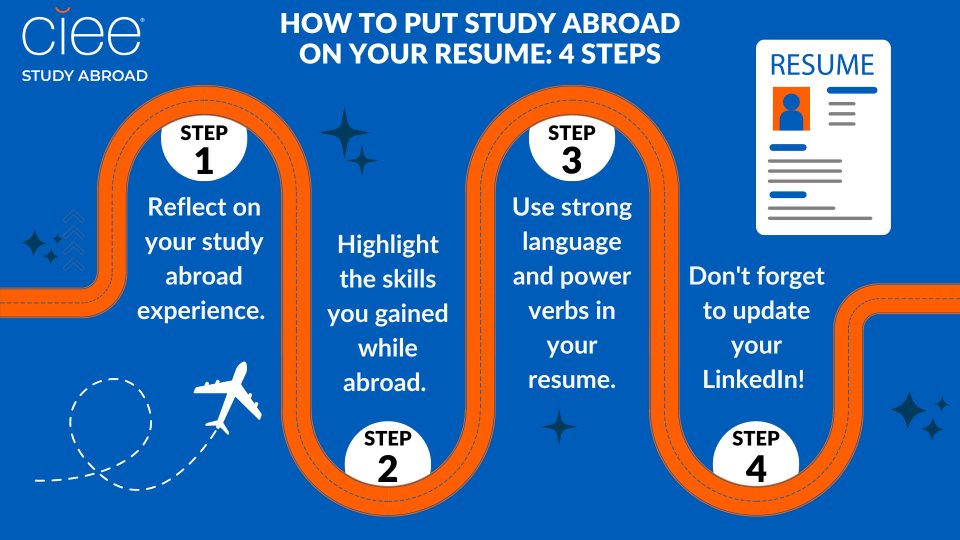How to Put Study Abroad on Your Resume: 4 Steps
You want to study abroad for all the right reasons: to immerse yourself in a new culture; gain new worldviews; develop and/or advance your language skills; and make new friends in faraway places.
But did you know that study abroad is also good for your resume? It so is.
Study abroad is a GREAT way to highlight your personal achievements and set you apart from the competition – no matter your major/minor or career path. From gaining real-world work experience by interning at a German startup to studying sustainability and conservation in a Costa Rican cloud forest, CIEE can help you boost your resume with study abroad.
Keep reading to learn how to translate your study abroad experiences into a tangible asset for your resume that will help get you hired.

Does Studying Abroad Look Good on Your Resume?
You bet it does.
So often students shy away from studying abroad because they are too busy trying to do all the things they think are necessary for landing a job after graduation.
The truth is, good study abroad programs actually provide those things – and then some.
Just think about it. Employers today need new hires who possess diverse perspectives, are adaptable to new ideas, and have strong communication skills. Know how you can comprehensively build each of these skills all at once? You guessed it – study abroad.
Let’s explore why it’s viewed as a positive by so many employers and why you should include study abroad on your resume.
Reason #1: It demonstrates adaptability and global thinking.
When you go abroad, everything is new to you. Your only choice is to figure things out. And you do. You adapt.
In the workforce, being adaptable is a highly versatile – and in-demand skill – that’s extremely valued by employers. They need you to join their team with the willingness to take on new, challenging, and quite likely ever-evolving situations.
Studying abroad also refines your ability to think more globally and to better understand cross-cultural communication. Whether you aim to work for a multinational corporation or a local business, knowing how to communicate with people from different backgrounds is a key and essential skill.

Reason #2: It sets you apart from other candidates.
These days, everyone applying for the same jobs as you are going to have a degree. Everyone will have achievements that are co-curricular or earned in the community or at an internship. But you can point to the many ways you achieved all that while living just beyond your comfort zone.
By studying abroad, you’ve demonstrated:
- Willingness to try new experiences and take on certain risks
- Resilience in new and challenging situations
- Independence and resourcefulness
- Cross-cultural competence
Highlight these hard-won attributes and your potential employer will be impressed and more apt to put your resume in the “to interview” pile.
How to Write a Line for Study Abroad on Your Resume: 4 Steps
See how study abroad gives your resume a boost? Now, let’s discuss how to effectively highlight your study abroad experience on your resume. We see it as an easy four-step process.
Step #1: Reflect on your study abroad experience.
Ask yourself:
- Why did I want to study abroad?
- What goals did I set for myself while there?
- Did I achieve these goals?
- What did I learn while abroad?
- What experiences helped me?
- What part of my experience can help me stand out to employers?
- What challenges did I face and overcome?
- How did going outside my comfort zone change my perspective?
Step #2: Highlight the skills you gained while abroad.
Your reflection should lead you to a better understanding of the skills you gained during your study abroad experience.
Think of the skills that matter to your prospective employer: communication, adaptability, cultural awareness, independent thinking, leadership, time management, resilience, persistence, and more. Call attention to these skills directly on your resume and in your letter of introduction.

Step #3: Use strong language and power verbs in your resume.
Words matter. Use them intentionally and potential employers will respond well. We recommend words of powerful persuasion like power verbs and power adjectives.
Power verbs are those action words that convey a positive meaning, such as:
| Achieved | Completed | Conducted | Coordinated | Designed |
| Developed | Encouraged | Explored | Fostered | Grew |
| Identified | Influenced | Organized | Produced | Strengthened |
Also, use adjectives to paint a compelling picture of you. Keep your adjectives strong and positive, too. Think:
| Adept | Astute | Attentive | Curious | Dedicated |
| Driven | Enterprising | Globally-minded | Independent | Insightful |
| Motivated | Persistent | Resourceful | Strategic | Thorough |
Use language to create a dynamic resume that effectively communicates your achievements and capabilities.
Step 4: Don't forget to update your LinkedIn!
LinkedIn is where employers search for qualified candidates and employees network and find new job opportunities. This powerful tool can help you connect with the right opportunity – if you use LinkedIn properly.
Think of your LinkedIn profile as a supplement to your resume. Add your study abroad experience – and relevant work experience and education – to your LinkedIn, so employers know what a capable and adventurous candidate you are!

Where to Put Study Abroad on Your Resume
Use it, don’t lose it. By this we mean make your study abroad experience stand out on your resume. Do not bury it alongside your GPA.
Consider the type of job you’re vying for, as this will help determine the best section to highlight your study abroad experience on your resume. Study abroad typically stands out in the Education, Skills, or Work Experience sections of a resume.
Section #1: Education
Your study abroad experience is no side note. Studying abroad is a strong part of your collegiate academic experience.
Make it visible. Use strong, positive words like those discussed above. And be sure to include the program in which you participated, the partner university’s name (if applicable), noteworthy courses you enrolled in, any relevant academic excursions, and/or community involvement.
Succinctly explaining how your study abroad program tied to your major/minor will show the impact international education had on your studies back home. And how you can use your learnings from abroad to impact your career goals.
Section #2: Skills
If it makes more sense to highlight your study abroad experience under “Skills” on your resume, then that works well, too.
This is especially fitting if you took on a volunteer assignment or worked on major projects. And again, go all in on active, powerful words.
Section #3: Work Experience
Did you participate in a part-time or full-time global internship? In this instance, plugging your study abroad experience under “Work Experience” will likely be your best move.
As you know, Work Experience is among the higher-priority sections of your resume for potential employers. Highlighting your global internship in this section will demonstrate how you not only pushed yourself out of your comfort zone by living and learning abroad – but you also pushed yourself to the next level by gaining transferable professional skills from on-the-job-training.
Hopefully, you even formed lasting connections while growing your professional network abroad that you can tap into for references!

Change Your Life
Whether you’re just beginning your study abroad journey or you’ve recently ended your CIEE program, there’s great value in learning how to put study abroad on your resume. With these tips, you have the guidance you need to make your resume shine.
Give your future employer the full picture of you they’re looking for by including study abroad on your resume!
And if you’re just getting started, learn more about why study abroad is as life-changing as people say it is.

